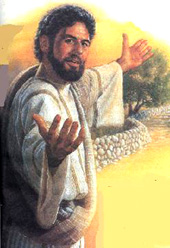
~ Belief ~ by Deborah Beach Giordano
"Credo"
The word "creed" comes from the Latin credo: "I believe." Therefore a creed is a statement of faith: a short-form version of what you understand to be true about God and about humankind. In the traditional medieval formula, it is what we believe, what we hope for, and how we are to live.
Most of us, when faced with such deep and weighty topics, are tempted to either 1) ignore the whole thing; or 2) begin writing a Summa Theologica that would compete with the eight volumes produced by Thomas Aquinas. The first isn't a very helpful choice, and the second would take a lifetime. Over the years the Church has offered various answers for us: the Apostle's Creed, the Nicene Creed, the Athanasian Creed... But we didn't help compose them, and often they don't really say what we believe. Where did those come from?
In the Beginning
When the first small communities of Christ-followers began, they came together to "pray, sing hymns, and lift one another up in courage and hope." They knew what they believed: that Jesus of Nazareth was the Christ — the anointed One who had come to proclaim God's kingdom. As the communities grew larger, and second- and third-generation believers joined in, disputes began to arise about Jesus' true nature. Was he utterly divine or merely human — or both, combined?
Initially, the Christians were faith-filled and confident enough to (in the much later words of John Wesley) allow one another to "think, and let think.' Later, however, certain leaders felt the need to impose their understanding on other believers. Perhaps it was their own doubts, perhaps a need to control; whatever the reason, these bishops wanted to be right — and for them, that meant that someone else had to be wrong.
Things Go Rapidly Downhill
 Formal creeds originated as a device to encourage Christian unity on the topic of "the nature of Christ." The earliest, the Nicene Creed, was formulated in 325 at the command of the Emperor Constantine, in an effort to bring peace to the squabbling regional bishops: each of whom insisted that his particular understanding of "who Jesus was" was correct. The Emperor threatened to keep the group locked up together until they came to an agreement. Thus the first creed was written by a Committee.
Formal creeds originated as a device to encourage Christian unity on the topic of "the nature of Christ." The earliest, the Nicene Creed, was formulated in 325 at the command of the Emperor Constantine, in an effort to bring peace to the squabbling regional bishops: each of whom insisted that his particular understanding of "who Jesus was" was correct. The Emperor threatened to keep the group locked up together until they came to an agreement. Thus the first creed was written by a Committee.
As has been rightly said, a camel is a horse put together by a committee. The Nicene camel did not, alas, put an end to Christian in-fighting. Instead, the creed itself became a source of disagreement between believers. Competing creeds were composed. Blood was spilled during battles waged for and against the inclusion of certain phrases about "the nature of Christ." The lasting split between the Western (Roman) and the Eastern (Orthodox) Churches began with an argument over a single word.
Loyalty Oaths
During the Middle Ages creeds became litmus tests to identify "heretics." This became increasingly important when the Inquisition was in full swing. The words became a form of loyalty oath: if you swore to believe the doctrinal statements, then your Christianity was considered "orthodox."

Martin Luther, with typical German thoroughnesss, went a step farther. He developed a Confession of faith, consisting of 28 subsections, each detailing a particular aspect of Christian belief. This "Augsburg Confession" became the cornerstone of most Reform theology. It was later refined and expanded in the Westminster Confession of Faith, completed in 1647.
In the new frontier of America, many of the new Protestant sects set aside the use of Creeds, choosing instead to draw on material in the New Testament. Excerpts from the Epistles were frequently used to define "who Jesus was."
What's the Point?
Sadly, what began as a way to bring peace and unity became a cause of division among Christians. Many folks — perhaps you are one of them — sit in silence when the Creed is recited, finding the statements or the language incompatible with their understanding of who Jesus is, and what God is like. Rather than help the faithful articulate what we believe and how we ought to live, these feel like lists of issues we disagree with.
What's the Solution?

The best place to start is within your own heart: what do you believe? Begin with John Wesley's classic question: "How is Jesus the Christ for you?" What do you understand to be the message of the Gospels? How does your call to follow Christ affect your daily life: your relationships with family, friends, coworkers, strangers?
Some people find it easier to begin with an existing Confession — and write a counterpoint to it: "This is what I don't believe." That can be a fine place to start: just remember that the goal is to create a statement of faith: to speak what your heart knows to be true.
A Contemporary Creed
Below is a link to a creed I wrote several years ago. I revisit it from time to time to refresh my commitment to my "Mission Statement," and to be sure that it is still an accurate reflection of my understanding, hopes, and belief. Perhaps you will find it helpful in constructing your own, and you are certainly welcome to use it, if it speaks to your soul.